Results,
table and transfers 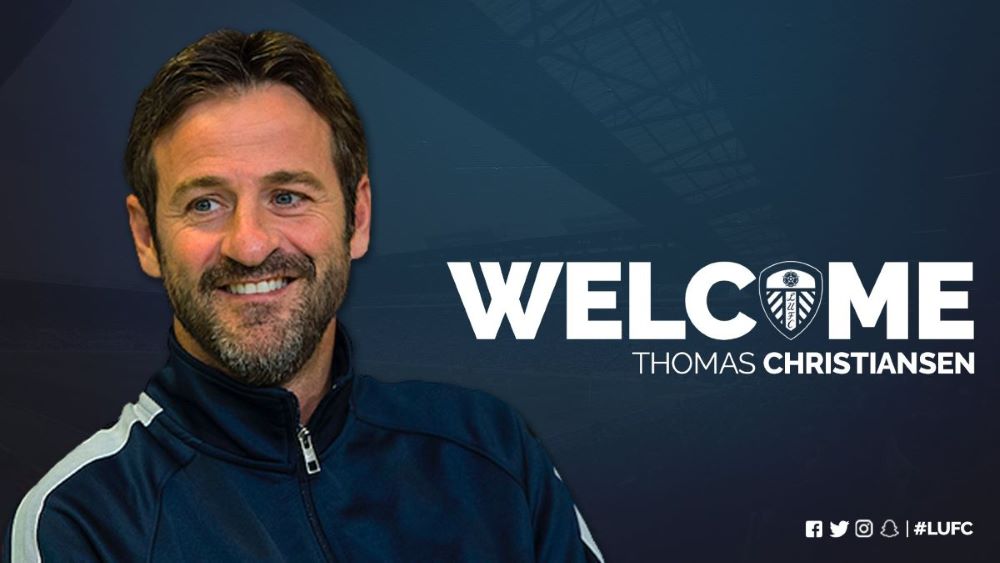
15 June 2017.
'White smoke from ER! Big day for @LUFC fans. Thank you for the patience
and support, our manager will be announced very soon.'
Andrea Radrizzani's tweet hinted at big news for the fans as he took
his first real step with Leeds as a football entity with his appointment
of a replacement for Garry Monk.
But PLOP! went the temperature when the news broke that the new man was
an unknown 44-year-old Dane, Thomas Christiansen, who had been given a
two-year contract.
It was an echo back to the days of Dave 'Who' Hockaday and a less than
overwhelmed Sco060 tweeted back, 'Hope you won't live to regret this.
Seems as though nothing has changed ... cheap option!'
Aitor Karanka's availability and his connection with Victor Orta had
made him the clear favourite, with Monk's assistant Pep Clotet, Claudio
Ranieri, Marco Silva, Jaap Stam and Alan Pardew all said to be in the
running.
Christiansen's managerial pedigree consisted of three years in Cyprus.
He had just steered APOEL Nicosia to the last 16 of the Europa League
and to the Cypriot first division title, with the loss of two games and
the best defensive record with 27 clean sheets. APOEL also reached the
final of the domestic cup, where they lost to Apollon Limassol.
John Leonidou of uefa.com told BBC Radio Leeds, 'I am confident
he will be able to handle the pressure at Leeds. He certainly had a good
crash course at APOEL where he was under tremendous pressure but always
kept his composure.
'He is a really nice guy and he speaks very good English, Spanish and
Danish. The players at APOEL spoke highly of him and found him very approachable.
'He generally liked to play a 4-5-1 with APOEL, occasionally switching
to a 4-3-3. APOEL were not prolific and their main strengths under him
were defending and keeping the ball. I would not expect a Barcelona style
of football but he will certainly tighten things and make them tough to
beat.
'He is very ambitious and he will be delighted with this move. To get
a chance to coach such a big team in England will be a dream for him.'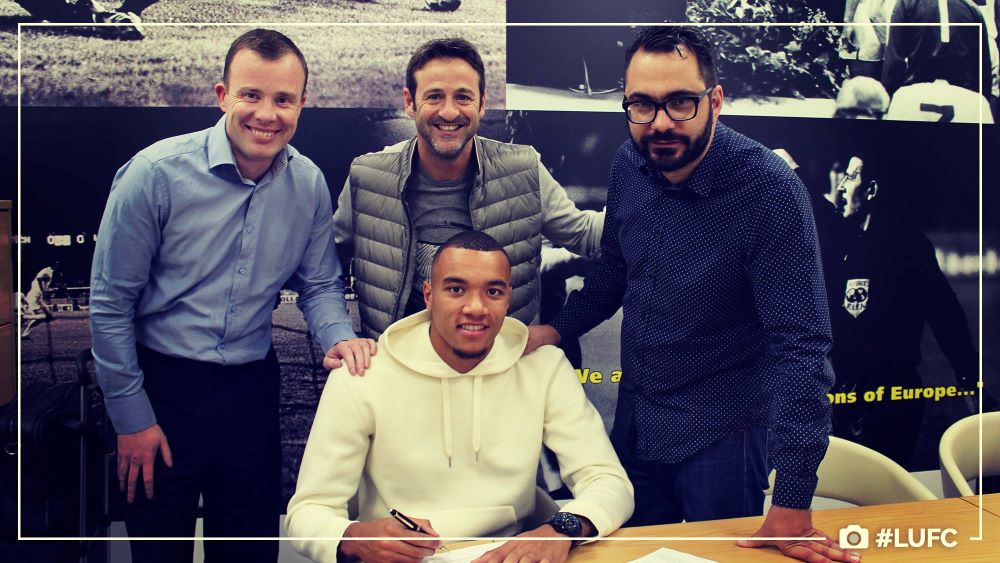
back to top
'A really nice guy…' Hmmm? The noises from the Leeds fans weren't great
and rumours began to circle that APOEL had dispensed with his services
when he was released on the day Monk departed, but Christiansen insistently
denied that he had been sacked.
'In a discussion with the directors of the club, we realised we had achieved
what we set out to achieve … The mentality in Cyprus is such that you
quickly change coach. On average, they have two to three changes of manager
per club a year. For me, then, it was unheard of that I could work solidly
and with continuity for three years … That's why I signed a one-year contract
with APOEL, even though they offered me two years.'
Christiansen's playing days began at Barcelona in 1991. Despite never
making the first-team, he won a couple of Spanish caps. He went on to
play for Real Oviedo, Villarreal, Bochum and Hanover, the high point coming
when he was joint leading scorer in the Bundesliga in 2003.
Christiansen impressed at interview. Radrizzani commented, 'I liked his
approach, very humble but at the same time very motivated to become the
coach of Leeds. He was prepared and for the first time I saw a manager
come in with a Powerpoint and details … This was very important, details,
because it means someone is hard-working, in two days he prepared.'
Angus Kinnear commented, 'Thomas was someone who had been on our radar
from the very early stages of the process and quickly established himself
as the outstanding candidate. We are confident we have found a man who
can work with us to take the club to the next level.'
Christiansen was a good fit for the profile that Radrizzani had set out:
a young coach with a decent amount of experience but who was happy to
work within the structure at Leeds.
Despite the initial misgivings, after some reflection the fans were positive;
almost 75% of those voting on the waccoe.com website thought Christiansen
would be a success.
The club wanted a fresh approach, the entire structure aligned with a
more European model. The new recruitment direction saw Orta focus on maximising
the value from various European leagues with the likes of Gjanni Alioski,
Felix Weidwald, Caleb Ekuban, Samu Saiz and Mateusz Klich signed from
across mainland Europe.
Spending was lavish by recent standards. Outgoings in the previous three
seasons had been less than £7m a year, a pittance against the outlays
of Aston Villa (£88m), Newcastle (£41m), Wolves (£32m), Fulham (£24m),
and Derby (£21m). Orta's spending soared to £28m, as much as total expenditure
over the previous six years.
Christiansen enjoyed a reasonable start, a 3-2 victory at promoted Bolton
with Monk's talisman Chris Wood heading the second. But Wood was soon
off in a £15m move to Burnley, where he rejoined left-back Charlie Taylor,
signed a month earlier for £6m.
Rob Green was also on the move. Having asked for a guarantee that he
would be first choice, he was dropped to make way for Wiedwald. Days into
the season he left for Huddersfield where he would continue to be back-up.
Leeds had a potential superstar to replace Wood. Spaniard Samu Saiz announced
himself with a sparkling hat-trick against Port Vale in the EFL Cup. The
fee paid to CD Huesca was £3.1m, but Saiz looked worth at least double
that as he gave an all-star show, with new signing Caleb Ekuban grabbing
the fourth goal.
But Ekuban was no Chris Wood and Leeds badly needed someone to get the
goals, enduring two scoreless draws at home to Preston and Fulham with
Wood saving himself for his new employers.
Goals from Saiz and Dallas secured victory at Sunderland, and Roofe and
Alioski did the same at Forest as Leeds moved up to third, though Cardiff's
five straight wins left them clear at the top.
Victor Orta had been trailing Hamburg striker Pierre-Michel Lasogga throughout
the transfer window and finally signed him on a season-long loan on the
last day of August.
The omens were not great with the 25-year-old deemed surplus to requirements
after netting one goal in 20 Bundesliga outings the previous season. He
had come close to a full cap for Germany in 2014 before injury ruled him
out and there were worries about his fitness and motivation. A good start
at Hertha Berlin was unhinged by an anterior cruciate ligament injury
and he continued to be dogged by injury.
A £50,000-a-week salary was an obstacle, but Hamburg subsidised the deal
in an effort to offload him before the transfer window closed.
We should have seen the writing on the wall.
back to top
Orta also signed Pawel Cibicki and Jay-Roy Grot, but neither man lived
up to the promise of their YouTube highlights.
Other newcomers were every bit as disappointing: Spanish midfielder Madger
Gomes was no Pablo Hernandez and made just two EFL Cup appearances after
a free transfer from Liverpool; German goalkeeper Felix Wiedwald kept
a series of clean sheets but was later exposed as a liability and a nervous
wreck; Premier League defensive loanees Matthew Pennington and Cameron
Borthwick-Jackson were rapidly seen to be out of their depth.
Christiansen had little influence over transfers, considered the exclusive
province of Orta. The Dane replied, 'you'll have to ask Victor' when asked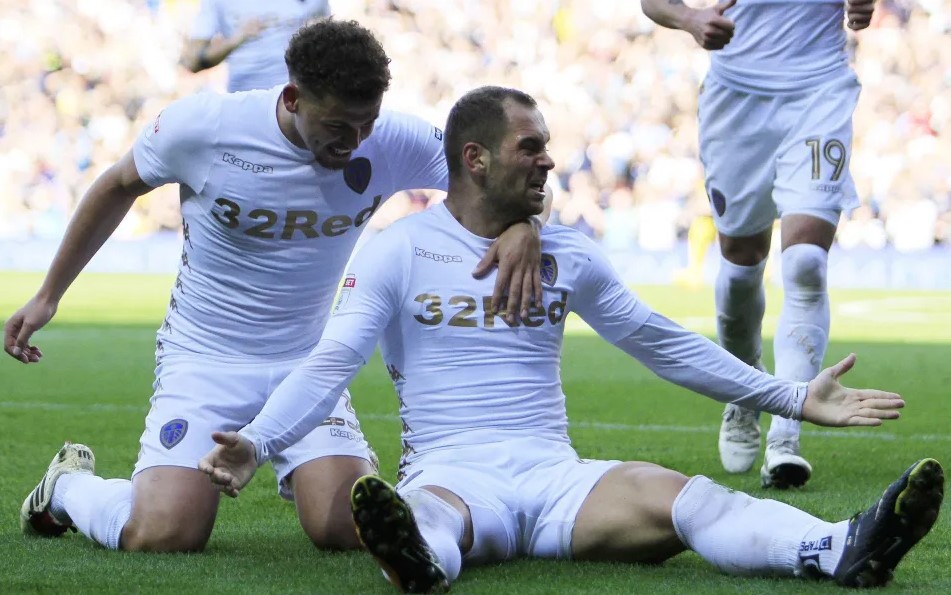 about targets.
about targets.
Other than Lasogga and Saiz, only Gianni Alioski and the Dutchman Vurnan
Anita of the newcomers had any real impact, although it was limited.
Alioski, a Macedonian international, made his name in Swiss football.
Having begun his career as a left-back, he was converted into a winger
when he joined Lugano in 2016 and was the third top goalscorer in the
league. He brought energy and verve to the left wing and a real goal threat,
but was a loose cannon, inconsistent, too often falling into straightforward
offside traps. His confrontational nature saw him go toe to toe with opponents
in needless shows of aggression.
Much had been expected of Anita, signed from Newcastle after six years
at Ajax. Notionally a defensive midfielder, he did a sound if unspectacular
job, used almost exclusively to fill the problem left-back position. But
why buy a midfielder to play him in a specialist defensive role?
Things started incredibly well for Lasogga; despite his wife being heavily
pregnant at home in Germany, he insisted on making himself available for
a debut at home to Burton on 9 September. He topped off a powerful display
with two goals in a 5-0 victory and looked the real deal, silencing a
number of critics who had questioned the wisdom of his signing.
'Top of the league,' crowed the Kop as they watched Leeds beat Birmingham
2-0 three days later, with Lasogga on the score sheet again. Christiansen
seemed to have a magic touch as Leeds posted a sixth successive clean
sheet and looked genuine promotion contenders.
But that was his peak hour; the performance against Birmingham flattered
to deceive and Leeds lost eight of the next 11, a 4-1 defeat at Wolves
on 22 November seeing them plunge to tenth.
Their season began to unravel when they travelled to Cardiff at the end
of September. Leeds were top on goal difference, level on points with
Wolves and the Bluebirds, now managed by Neil Warnock.
Christiansen gave Klich his first Championship start in the Leeds midfield
after a couple of substitute appearances and two EFL Cup starts. It was
effectively the beginning and end of his first season at the club, a disastrous
game for him as Cardiff swept Leeds aside with a wave of passionate football.
The home side's pressure unsettled Leeds, unhinging Christiansen's favoured
possession game, and led to the first goal after 28 minutes.
Klich's slip gave possession to Damour and Zohore fired in from a few
yards.
The Pole laid the blame for his error on poor boot selection and claimed
that Christiansen then froze him out of the first-team picture. He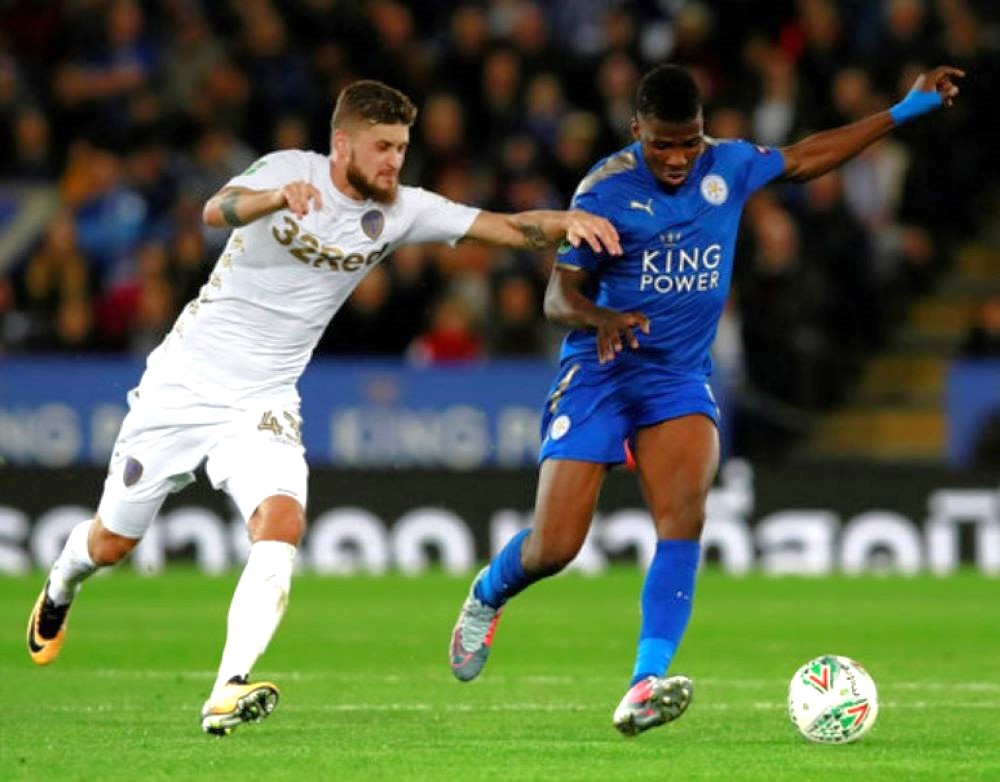 would make one further appearance off the bench (in December at Birmingham)
before being loaned out in January.
would make one further appearance off the bench (in December at Birmingham)
before being loaned out in January.
Much had been expected of the 27-year-old Polish international. The son
of a former footballer, Klich had begun his career under his father at
Poland's oldest club, Cracovia. From there, Klich headed to German outfit
Wolfsburg in a €1.5m deal, before successful spells at PEC Zwolle, Kaiserslautern
and FC Twente attracted Orta's interest.
As the midfielder left to join Eredivisie side FC Utrecht, Klich vowed
he'd be back to prove himself at Leeds, but few gave that one much credibility.
back to top
Some of Klich's colleagues also had an evening to forget at Cardiff.
Liam Cooper had a nightmare, sent off in first half stoppage time after
clocking up two yellow cards in less than ten minutes for rash challenges.
By then Leeds were already two down and conceded a third just before
the hour. Roofe, replacing Lasogga up front, netted a consolation goal
eight minutes later but Leeds were well beaten.
It was the direct approach that did for United, who had suffered their
first defeat two games earlier in similar fashion at Millwall. Cooper
said it 'hit the players hard … Teams, I think, after that game set up
a lot differently against us. They did try and bully us and maybe we weren't
used to that. The lads who'd come in, it was maybe an eye-opener for them.'
Christiansen had seen his style picked apart and had no answer. He was
unwilling to flex his rigid 4-2-3-1 system, no matter how freely he talked
in press conferences about lining up with three at the back or two up
front. His substitutions were always made far too late in the day to rescue
lost causes.
The mercurial Saiz fluctuated between awesome and anonymous and Christiansen
lost faith in Wiedwald, dropping him to bring in Andy Lonergan.
Leeds rallied and were back up to fifth after going six games undefeated
but other clubs had rumbled Christiansen's tactics. He was obsessed with
the passing-out-from-the-back style which Wiedwald had been signed to
facilitate, but once that was countered the keeper was a lame duck, timid
and indecisive.
After Wiedwald conceded six goals in defeats at Cardiff and Hillsborough
before the international break, Christiansen remained supportive, saying,
'Everyone has to settle in. I'm still settling in! Felix is not the only
one. We must remember his six clean sheets.'
After such backing, it was a surprise to see him replaced by Lonergan
for the home game with Reading.
It was a severe blow to Wiedwald's confidence, especially when Christiansen
admitted after the game that he had 'been thinking about the goalkeeping
situation for a while. Right now it is Felix's turn to be on the bench.'
Lonergan kept the jersey for the next eight games, until he had his own
succession of nightmares, which led to Wiedwald's recall.
On 9 December, with Leeds 2-0 up at Loftus Road against QPR and cruising
courtesy of a Kemar Roofe double, Wiedwald suffered a personal 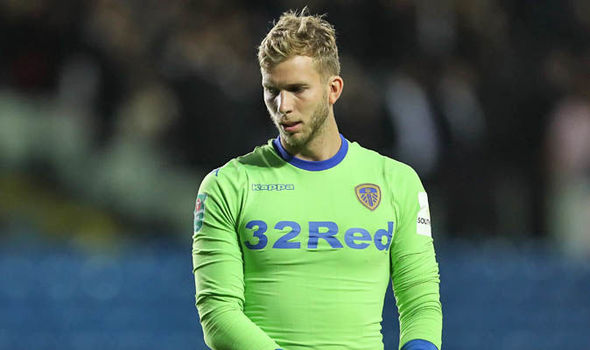 nightmare
as he inexplicably allowed a hopeful 40-yard punt from Pawel Wszolek to
bounce softly over him as the game entered stoppage time. However, with
Rangers pushing on, Leeds broke away and Roofe showed composure to finish
his hat trick with a smart shot from Saiz's pass.
nightmare
as he inexplicably allowed a hopeful 40-yard punt from Pawel Wszolek to
bounce softly over him as the game entered stoppage time. However, with
Rangers pushing on, Leeds broke away and Roofe showed composure to finish
his hat trick with a smart shot from Saiz's pass.
It was the worst of a number of 'oh my God' moments for the hapless German
keeper, bought for £500,000 from Werder Bremen in the close season.
Confidence was brittle and the team's form disintegrated; a seven-game
spell without a victory included an embarrassing FA Cup defeat at League
Two Newport, whom Leeds had thrashed 5-1 in the autumn.
It was another low point for Christiansen, and he was pilloried for poor
team selection. Samu Saiz, summoned from the bench to chase an unlikely
equaliser, was sent off in injury-time for spitting. The Spaniard had
been accused of the same offence by Port Vale boss Michael Brown in August
but cleared of wrongdoing on that occasion.
He was banned for six games and felt compelled to apologise to team-mates
and supporters.
'I give my word to all those connected to Leeds United that I will learn
from this and never repeat it,' he said.
back to top
Cooper, O'Kane and Berardi were each dismissed in the four games that
followed as discipline disintegrated. Saiz was sidelined until 20 February,
by which time Christiansen had been given his marching orders.
A 4-1 defeat at home to Cardiff on 3 February was the final straw for
Radrizzani. The withdrawal of Lasogga after 74 minutes was greeted with
jeers and chants of 'you don't know what you're doing'. Christiansen was
a rabbit caught in the headlights. Leeds were tenth, seven points off
the play-offs.
The following day Radrizzani swung the axe, saying the Dane had failed
'in terms of communication, leadership and confidence'. The owner admitted
his mistake in appointing him.
'He seemed to be someone successful and fresh who could match with the
new phase of the club, my new management and the new freshness around
the team' said Radrizzani. 'But if you watch the games, we conceded so
many chances early on, in the first few minutes. This is a sign that mentally
the players are not relaxed. They are stressed and this is why I could
feel that probably the manager was not transmitting security and confidence.
'I waited for a long time before taking the decision and gave him many
chances. Already at the beginning of January, I was really keen to change.
Victor convinced me to hold on and give him one more, one more, one more;
extra chances but at the end, something was missing.
'If I'm a Leeds United fan and I pay for the ticket I can't watch a show
like last Saturday. Last Saturday we touched the bottom.
'We backed him and very strongly after a long negative series. Personally,
I defended him and supported him in front of all the players before the
game against 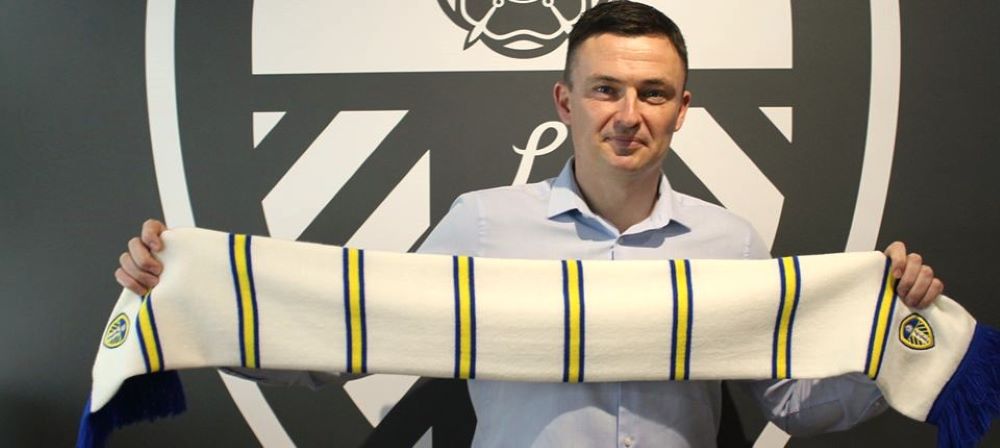 Middlesbrough.
He deserved it and we believed in his quality because at the beginning
of the season we were playing smooth football, with good results.
Middlesbrough.
He deserved it and we believed in his quality because at the beginning
of the season we were playing smooth football, with good results.
'This time was the point of no return. There is enough time to make this
season positive. Now or never.'
The failure cut Radrizzani to the quick; this wouldn't be the plain sailing
that the Italian's previously sure-footed stewardship had promised. Steve
McClaren, Simon Grayson and Jaap Stam (again) were all touted as possible
replacements, but Radrizzani instead turned to a young local, Barnsley
boss Paul Heckingbottom, 40, describing him as someone 'who knows the
territory'.
The former Barnsley defender had guided the Tykes to a double of promotion
from League One and the Johnstone's Paint Trophy in 2016 as caretaker
manager. The double success prompted his permanent appointment.
Reports of Heckingbottom's potential were enough for Radrizzani, who
hired him without even meeting him, paying £500,000 to activate a release
clause in his contract. The deal, signed two days after Christiansen's
dismissal, was for an initial 18-month period.
Barnsley pronounced themselves 'shocked' by the news, which came just
three days after they signed a new rolling contract with Heckingbottom.
He told a different story, claiming that the announcement of his new
contract at Oakwell had been delayed at Barnsley's request.
In December, chairman Patrick Cryne and his family had agreed to sell
the club to new owners. A month later, Cryne died from cancer
'Patrick's health had deteriorated really badly then and I was asked
whether I'd mind delaying the announcement of the contract … We knew that
Patrick was sadly going to pass away. The club rightly wanted to keep
some good news for further down the line and pay our respects, so that
was not a problem, so all that it was was the timing of when the club
chose to release it and it just so happened that a couple of days later
Leeds came in for me.
'It was naïve on my part in terms of the questions I needed to ask at
Leeds. They could have told me anything, an absolute horror story, I was
that committed to leaving that I'd have gone regardless and it's the wrong
frame of mind to be in, but that's where I'd got to.
'My remit going in was, "Look Paul, the owner's put a lot of his own
money in and the only way now we can increase the budget and get to near
the top of the league in terms of competing finance-wise is selling players,
developing our own, buying our own, developing, selling at a profit."
Essentially the Barnsley model.
'A lot were going down that route. We've got a problem with discipline
at the minute, there were four players suspended when I went in, we've
got no connection with the Academy, no players coming through and we want
a more aggressive style of play in terms of when we've not got the ball,
something the fans can identify with … We had a financial director, a
director of football, owner, this is where you fit in. Right, this is
what I do, this is what it looks like, this is what you're gonna have
to do, and everything was agreed and really simple, but looking back now
that was more the financial director, director of football's ideas and
they'd got Andrea to buy along with.'
His appointment felt like a move born of panic, with nobody having any
notion of how to reverse the decline. Heckingbottom had a reputation for
developing young players and making the best of a bad lot. He seemed a
good fit for the modern structure that Radrizzani, Orta and Kinnear wanted.
back to top
'I was happy with the decision I'd made … The only way I'd have still
been there was winning more games, and I get that.'
Heckingbottom's first game in charge saw Leeds lose to Sheffield United.
It was obvious that changes were badly needed and the new man went on
to 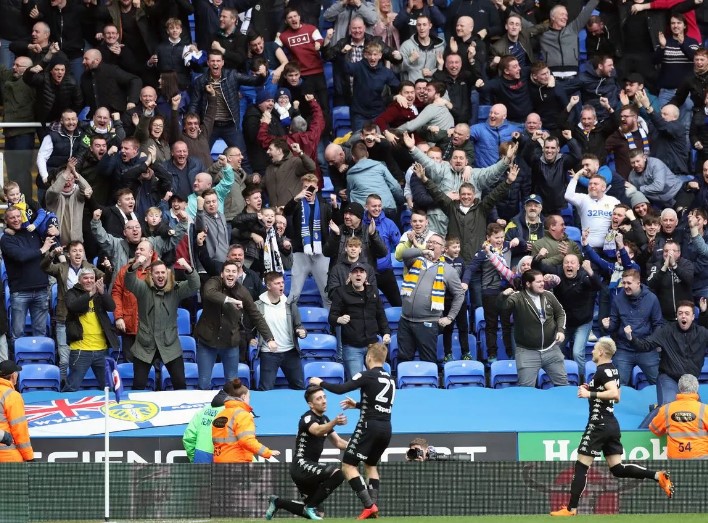 blood
Academy players Bailey Peacock-Farrell, Tom Pearce, Paudie O'Connor, Hugo
Díaz and Ryan Edmondson.
blood
Academy players Bailey Peacock-Farrell, Tom Pearce, Paudie O'Connor, Hugo
Díaz and Ryan Edmondson.
There was just one victory in Heckingbottom's first seven games, and
none in Christiansen's final six Championship fixtures. Radrizzani was
particularly unimpressed with the players' attitude during a 3-0 reverse
at Middlesbrough which saw play-off hopes recede. He said that he did
not want this type of player representing the club.
There was no new manager bounce and the focus fell on the paucity of
players that Orta had brought in, with many fans calling for his head.
There was a good group of players there who had some talent,' said Heckingbottom,
'but there was also a big group behind that and into the Under-23s who
were never going to play.
'When you've got all the players about you and the building, hanging
around, it just detracts from everything you're trying to achieve, the
hunger, the drive, and everything that I've been about and the team's
been about. That's one way to straight away make that better, move them
on, get rid of them. Difficult when you're coming straight after a window,
you know all these things are going to have to be done in the summer.
'Obviously they're blocking the progression of the young boys. We gave
five league debuts, some of them we wouldn't have, it's just with the
injuries, the suspensions, we had to put them in, others were better than
what were there.
'Bailey Peacock-Farrell deserved to be in, maybe not at that opportunity
but I had to do something. We weren't happy with the goalkeeper in front
of him. Similarly, with Tom Pearce, a player who I'd seen in the Under-21s
a couple of years previous, athletically really good, still got lots of
areas to improve but deserved his chance.'
Heckingbottom was ruthless. Wiedwald lasted five games before his composure
deserted him at Middlesbrough; Laurens De Bock, a big-name arrival from
Club Brugge, died on a muddled night at Derby. Eunan O'Kane was named
captain against Sheffield United and then failed to make even the bench
two games later.
'The recruitment needed to be focused on players who were capable of
playing in the Championship, not potentially capable,' said Heckingbottom,
'bringing in less players but who've proven they can play in England,
play in the Championship.
'Another one is evidence of real physical robustness. The squad needed
conditioning, really getting strong. You can carry a smaller squad then,
if they're physically strong enough, you've got enough cover and you recruit
for the key areas on the pitch.'
Heckingbottom's words resonate with what was to come over the next two
years, but that might be with the benefit of hindsight.
16 matches and almost four months provided ample evidence that Heckingbottom
was not the man to inspire a revival. None of his changes brought much
improvement. It was clear pretty quickly that Heckingbottom was not the
solution to Radrizzani's problems.
Heckingbottom's demise owed something to an inability on his part to
keep his counsel about his dissatisfaction with previous recruitment activity.
Blunt and to-the-point, he refused to toe the party line, hide his feelings,
even if it put his job at some risk.
'I knew what needed to happen and within the club there was an acceptance.
It was just making it happen. I can be happy with myself that I was truthful
and tried to make it happen. The one thing I could never have done is
sit tight, done nothing because you've got to try and fight for everything
and make things better … Then if it doesn't work out you've done everything
that you can and you can be happy with yourself.'
Heckingbottom won just two of his first 13 games in charge and his overall
record was four wins, four draws and eight defeats. Christiansen's progressive
style of football had been cast to the four winds and Heckingbottom was
more pragmatic. Within weeks he was another dead man walking.
'I wanted to try to give a shock to the team and stay around the play-offs,'
admitted Radrizzani. 'It didn't work but not all for his fault. I think
Paul could have a good career as a manager because he's direct, ambitious
and motivated. Probably he needs more time to grow. But at this point
we can't wait for someone to come here and form himself, with all respect.
It was the same with Thomas.'
Thomas.'
Many claimed that the problems were down to player recruitment and Radrizzani
conceded that the responsibility for the failure 'should be shared'. Leeds
spent more than £20m and were faced with paying off or auctioning several
players for peanuts. They also had to redress the mass signing of development
squad players which further strained the wage bill.
Yet Radrizzani remained fully behind Orta. 'Everybody can do mistakes
in my organisation, including me,' he said. 'As far as they do their best
and have passion, they are fine to learn from mistakes. Unless it's his
desire to leave, I will not have any doubt about that. I trust him and
Angus.
'How much money lost last season? The frustration is a lot. But in the
end I agree with Victor: they are not good or bad players … Maybe we picked
players who at the moment cannot be part of this project. The pressure
is very high. We can't wait ten years.'
Radrizzani was desperately in need of the thinking time that the summer
would provide, but first Heckingbottom had to put up with the ignominy
of leading a poorly thought out post-season tour of Myanmar, which brought
United strong criticism.
Myanmar's government and its military were the subject of widespread
international condemnation for the treatment of the Rohingya minority.
An estimated 700,000 had crossed the border into Bangladesh, fleeing a
military crackdown that the United Nations branded 'ethnic cleansing'.
The axe was delayed for financial reasons. A clause in his contract entitled
Heckingbottom to a £1m pay-off if he was let go before the start of June.
By holding off, Radrizzani saved himself £500,000.
Heckingbottom's departure was confirmed on 1 June via the club website,
with Angus Kinnear promising, 'Our objective is to bring in a head coach
with more experience who can help us reach the goals we have talked about
since we became custodians of the club last summer. We are confident of
making a quick appointment and we thank our fans for their continued support.'
Radrizzani, Orta and Kinnear had been in deep discussion about what to
do next. There would be no more experiments as Leeds hatched an ambitious
plan to secure the services of a proven leader.
Results, table and transfers
back to top















 about targets.
about targets. would make one further appearance off the bench (in December at Birmingham)
before being loaned out in January.
would make one further appearance off the bench (in December at Birmingham)
before being loaned out in January. nightmare
as he inexplicably allowed a hopeful 40-yard punt from Pawel Wszolek to
bounce softly over him as the game entered stoppage time. However, with
Rangers pushing on, Leeds broke away and Roofe showed composure to finish
his hat trick with a smart shot from Saiz's pass.
nightmare
as he inexplicably allowed a hopeful 40-yard punt from Pawel Wszolek to
bounce softly over him as the game entered stoppage time. However, with
Rangers pushing on, Leeds broke away and Roofe showed composure to finish
his hat trick with a smart shot from Saiz's pass. Middlesbrough.
He deserved it and we believed in his quality because at the beginning
of the season we were playing smooth football, with good results.
Middlesbrough.
He deserved it and we believed in his quality because at the beginning
of the season we were playing smooth football, with good results. blood
Academy players Bailey Peacock-Farrell, Tom Pearce, Paudie O'Connor, Hugo
Díaz and Ryan Edmondson.
blood
Academy players Bailey Peacock-Farrell, Tom Pearce, Paudie O'Connor, Hugo
Díaz and Ryan Edmondson. Thomas.'
Thomas.'